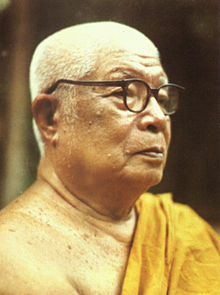Buddhadasa
Phra Dharmakosacarya (Nguam Indapañño) (Thai: พระธรรมโกศาจารย์ (เงื่อม อินฺทปญฺโญ); RTGS: Phra Thammakosachan (Ngueam Inthapanyo)), also known as Buddhadasa Bhikkhu (Thai: พุทธทาสภิกขุ; RTGS: Phutthathat Phikkhu, May 27, 1906 – May 25, 1993) was a famous and influential Thai ascetic-philosopher of the 20th century.

| This article about a religious leader is a stub. You can help out with Wikiquote by expanding it! |
Quotes
editIn everyday language, the word ‘birth’ refers to physically coming into the world from the mother’s womb. A person is born physically only once. Having been born, one lives in the world until one dies and enters the coffin. Physical birth happens to each of us only once. This birth from the mother’s womb is what is meant by ‘birth’ in everyday language.
In Dhamma language, the word ‘birth’ refers to the birth of the idea ‘I’ or ‘ego’ that arises in the mind throughout each day. In this sense, the ordinary person is born very often, time and time again; a more developed person is born less frequently; a person well advanced in practice (ariyan, noble one) is born less frequently still, and ultimately ceases being born altogether. Each arising in the mind of the idea of ‘I’ in one form or another is called a ‘birth’. Thus, birth can take place many times over in a single day. As soon as one starts thinking like an animal, one is born as an animal in that same moment. To think like a human being is to be born a human being. To think like a celestial being is to be born a celestial being.
- ‘Two Kinds of Language’ talk given at Suan Mokkh, October 1966, as cited in Buddhist Sutras Lesson Book (2012)